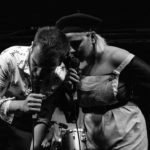Savages were a band who often spoke about sex, but seldom intimacy. Those aware of Jehnny Beth’s work in Savages may be taken aback by the, by comparison, open-diary approach of To Love Is To Live. Beth, now in her mid thirties, acknowledged in the Guardian recently that Savages was the loudest expression for searching for who she was in her twenties. To Love Is To Live feels like a cathartic pitstop in that ongoing journey, in a way that is much more direct and metaphor-free than before.
Beth’s Catholic upbringing is touched upon with brutal vulnerability on ‘Innocence’- a landscape where thoughts were internalised as being sinful as sexual acts, where it’s “bad form to think man isn’t a piece of shit“. ‘Innocence’ is a microcosm for the theme of the whole record – it’s rallying cry of “I don’t even care about sex no more, I want to do things with innocence” filters into the pores of the record. Beth meditates on how urban living has desensitised her in this clattering song; open-hearted admissions come at a rate of knot, echoing Jenny Hval at her most candid.
Single ‘I’m A Man’ scrutinises the record’s concerns from more of a distance – a cacophonous, dick-swinging character piece that unexpectedly releases tension by casting Beth alone at a piano, repeating the refrain like a mantra, re-contextualising everything that has come before entirely. Beth’s openness about her bisexuality is centre stage on ‘Flower’- desire marred by uncertainty. ‘We Will Sin Together’ succeeds in feeling genuine, carnal and emotional in equal measure, floating along on a fluid piano part, layered vocals and jittering synths.
It’s the final third or so of the record that confirms its greatness. ‘Heroine’, a song of primal longing, takes the instrumentation that made Blackstar so tremendous and urgent, and smears it in gothic sensibilities, Beth’s falsetto harmonising mesmerically with the saxophone part is one of the most ecstatic moments on the record. ‘How Could You’ (the most Savages-like song on the record) marries the familiar gang chants and pounding rhythm section with wailing, free-wheeling brass parts. The total apex, ‘The French Countryside’ sounds like the Suede at their most heartbroken and romantic – it’s a love song of loss, longing and self-reflection; a realisation of the magnitude of compromise. It’s the most effecting moment on the record and epitomises everything that makes the record truly great: honest, romantic, succinct. Closer ‘Human’ is widescreen and cinematic in its ambition and the perfect foil to ‘The French Countryside’ as we delve further into Beth’s psyche. Abstract and dreamlike, it’s a gentle release from Beth’s world that we’ve occupied for the last half-hour or so.
Rock music like this is increasingly short supply – ambitious and emotionally unselfconscious, vulnerable and tender while not being afraid to bear its teeth. You’ll struggle to find a more virtuously cathartic record released this year.
To Love Is To Live is out now on Caroline Records.




